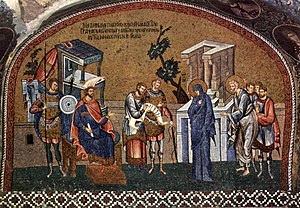Quirinius

Publius Sulpicius Quirinius (rendered in Greek Κυρήνιος Kyrenios, sometimes Grecized as Cyrenius, c. 51 BC - AD 21) was a Roman aristocrat: his governorship of Syria is one of the chronological anchors for the birth of Jesus.
Born in the neighborhood of Lanuvium, a Latin town near Rome, his family was rich but lacked political influence. Quirinius followed the normal pathway of service for an ambitious young man of his social class, serving in the Roman army and possibly participating in Octavian's campaign that culminated in the Battle of Actium in 31 BC. For the following decade he served in Spain, and upon assuming his first governorship, Quirinius defeated the Marmarici, a tribe of desert raiders, before becoming governor of Crete and Cyrene in 14 BC. In 12 BC he was named consul, a sign that he enjoyed the favour of Augustus. Six years afterward he was dispatched to govern Pamphylia-Galatia (in modern Turkey), where another successful military campaign earned him honors in Rome.
By AD 1, Quirinius had become chief advisor to Augustus' grandson Gaius Caesar, until Gaius died from wounds suffered on campaign. When he saw Augustus' support shift to his stepson Tiberius, he entered the latter's camp of followers.
After the banishment of Herod Archelaus in 6, Iudaea Province (the conglomeration of Samaria, Judea and Idumea) came under direct Roman administration. One of Quirinius' first duties was to carry out a census to assess the new province for tax purposes. At the same time Coponius was sent as prefect of Iudaea; but Quirinius went there also, as Legate of Syria, since the levying of the tax on the entire province was his special duty. The assessment was greatly resented by the Jews, and open revolt was prevented only by the efforts of the high priest Joazar. As it was, the census did trigger the revolt of Judas the Galilean and the formation of the party of the Zealots.
Quirinius served as governor of Syria with nominal authority over Iudaea until 12, when he returned to Rome as a close associate of Tiberius. Nine years later he died and was given a public funeral.
The Gospel of Luke mentions the census taken by Quirinius when he was governor of Syria, as part of a census of the "whole world", in connection with the birth of Jesus. However Luke and the Gospel of Matthew date the birth to the reign of Herod the Great, who died in 4 BC, nearly ten years before Quirinius became governor. Some historians assume that Luke is in error,[1] but others deny it[2]
See also
References
- ^ For example, James Douglas Grant Dunn, Jesus Remembered, (Eerdmans, 2003) p344. Similarly, Erich S. Gruen, 'The expansion of the empire under Augustus', in The Cambridge ancient history Volume 10, p157, Geza Vermes, The Nativity, Penguin 2006, p.96, W.D Davies and E. P. Sanders, 'Jesus from the Jewish point of view', in The Cambridge History of Judaism ed William Horbury, vol 3: the Early Roman Period, 1984, Anthony Harvey, A Companion to the New Testament (Cambridge University Press 2004), p221, Meier, John P., A Marginal Jew: Rethinking the Historical Jesus. Doubleday, 1991, v. 1, p. 213, Brown, Raymond E. The Birth of the Messiah: A Commentary on the Infancy Narratives in Matthew and Luke. London: G. Chapman, 1977, p. 554, A. N. Sherwin-White, pp. 166, 167, Fergus Millar Millar, Fergus (1990). "Reflections on the trials of Jesus". A Tribute to Geza Vermes: Essays on Jewish and Christian Literature and History (JSOT Suppl. 100) [eds. P.R. Davies and R.T. White]. Sheffield: JSOT Press. pp. 355–81.
{{cite conference}}: Unknown parameter|booktitle=ignored (|book-title=suggested) (help) repr. in Millar, Fergus (2006). "The Greek World, the Jews, and the East". Rome, the Greek World and the East. 3. University of North Carolina Press: 139–163. - ^ For example: see here no.2: Census of Quirinius, see only the sources; and also: Documentary proofs about Quirinius and the census in Syria/Judea in 8 BC (in German); and: Some considerations about Quirinius and his census (in German, with many original primarily sources, 22 December 2006)
The literature is given in Emil Schürer, Geschichte 3d ed., i. 508-543, the following works being especially important:
- T. Mommsen, Res Gestœ Divi Augusti, 1st ed., p. 121 (2d ed., pp. 175 et seq.);
- Karl Theodor Keim, Gesch. Jesu 3d ed., pp. 101 et seq., Zurich, 1873;
- David Strauss, Das Leben Jesu, 11th ed., i. 57, ii. 24, Bonn, 1895;
- Alfred Edersheim, Life of Jesus the Messiah, i. 182, London 1883;
- Francis Haverfield, in The Classical Review, 1900.
 This article incorporates text from a publication now in the public domain: Singer, Isidore; et al., eds. (1901–1906). The Jewish Encyclopedia. New York: Funk & Wagnalls.
This article incorporates text from a publication now in the public domain: Singer, Isidore; et al., eds. (1901–1906). The Jewish Encyclopedia. New York: Funk & Wagnalls. {{cite encyclopedia}}: Missing or empty|title=(help)
